
Janet Gaynor was an American film, stage and television actress as well as an accomplished oil painter.
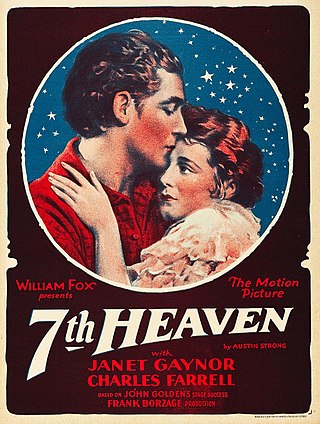
7th Heaven is a 1927 American synchronized sound romantic drama directed by Frank Borzage, and starring Janet Gaynor and Charles Farrell. While the film has no audible dialog, it was released with a synchronized musical score with sound effects using the Movietone sound system. The film is based upon the 1922 play Seventh Heaven, by Austin Strong and was adapted for the screen by Benjamin Glazer. 7th Heaven was initially released as a standard silent film in May 1927. On September 10, 1927, Fox Film Corporation re-released the film with a synchronized Movietone soundtrack with a musical score and sound effects.
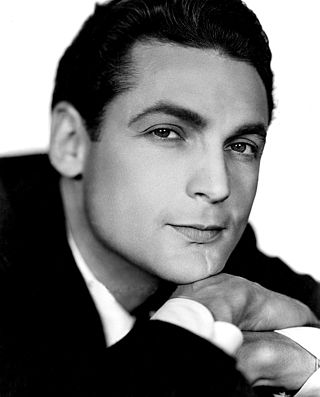
Charles David Farrell was an American film actor whose height was in the 1920s and 1930s and the Mayor of Palm Springs from 1947 to 1955. Farrell was known for his onscreen romances with actress Janet Gaynor in more than a dozen films, including 7th Heaven, Street Angel, and Lucky Star. Later in life, he starred on TV in the 1950s sitcoms My Little Margie and played himself in The Charles Farrell Show. He was also among the early developers of Palm Springs.

Marguerite Churchill was an American stage and film actress whose career lasted 30 years, from 1922 to 1952. She was John Wayne's first leading lady, in The Big Trail (1930).

Happy Days is a 1929 American pre-Code musical film directed by Benjamin Stoloff, which was the first feature film shown entirely in widescreen anywhere in the world, filmed using the Fox Grandeur 70 mm process. French director Abel Gance's Napoléon (1927) had a final widescreen segment in what Gance called Polyvision. Paramount released Old Ironsides (1927), with two sequences in a widescreen process called "Magnascope", while MGM released Trail of '98 (1928) in a widescreen process called "Fanthom Screen".
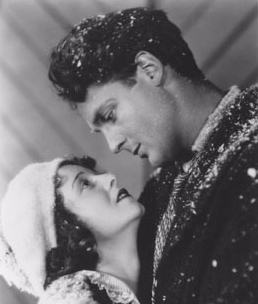
Lucky Star is a 1929 sound part-talkie American romantic drama film starring Janet Gaynor and Charles Farrell, and directed by Frank Borzage. In addition to sequences with audible dialogue or talking sequences, the film features a synchronized musical score and sound effects along with English intertitles. The soundtrack was recorded using the Movietone sound-on-film system. The plot involves the impact of World War I upon a farm girl (Gaynor) and a returning soldier (Farrell).

Delicious (1931) is an American pre-Code Gershwin musical romantic comedy film starring Janet Gaynor and Charles Farrell, directed by David Butler, with color sequences in Multicolor.

Merely Mary Ann a 1931 American pre-Code romantic comedy drama film starring Janet Gaynor and Charles Farrell. Gaynor and Farrell made almost a dozen films together, including Frank Borzage's classics 7th Heaven (1927), Street Angel (1928), and Lucky Star (1929); Gaynor won the first Academy Award for Best Actress for the first two and F. W. Murnau's Sunrise: A Song of Two Humans. The film, involving an orphan (Gaynor) and a flat-broke composer (Farrell), was written by Jules Furthman based upon Israel Zangwill's play of the same name and directed by Henry King.
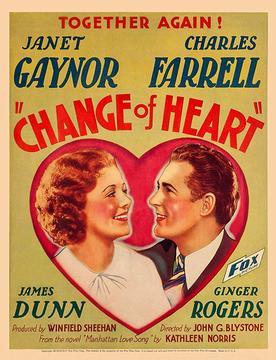
Change of Heart is a 1934 American pre-Code drama film starring Janet Gaynor, Charles Farrell, James Dunn, and Ginger Rogers. The movie, about a quartet of college chums who all move to 1934 New York City, was written by James Gleason and Sonya Levien from Kathleen Norris's novel, Manhattan Love Song and directed by John G. Blystone.

The Man Who Came Back is a 1931 American Pre-Code romantic drama film directed by Raoul Walsh, starring Janet Gaynor and Charles Farrell. The movie was adapted to screen by Edwin J. Burke from the play by Jules Eckert Goodman.
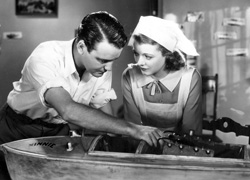
Servants' Entrance is a 1934 American Pre-Code musical comedy film. It was written by Samson Raphaelson from the Sigrid Boo novel and directed by Frank Lloyd, with a cartoon sequence by Walt Disney in which an understandably startled Janet Gaynor sings a song while obstreperous animated singing silverware prance around on her bed, an early example of combining live action with animation. Critics found this musical interlude especially charming.

The First Year is a 1932 American pre-Code film based on a 1920 play of the same name that originally ran on Broadway at the Little Theatre. The play was written by Frank Craven and produced by John Golden. It closed in 1922 after 760 performances.
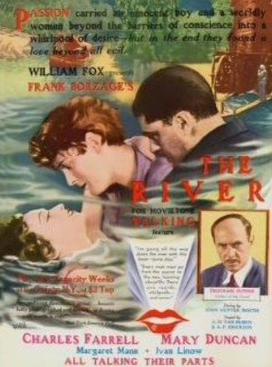
The River is a 1929 sound part-talkie drama film directed by Frank Borzage, and starring Charles Farrell and Mary Duncan. In addition to sequences with audible dialogue or talking sequences, the film features a synchronized musical score and sound effects along with English intertitles. The soundtrack was recorded using the Movietone sound-on-film system. Much of the film has been lost. A reconstructed version with the about 45 minutes of surviving film, using still images and explanatory titlecards to bridge the missing scenes, was produced by the Munich Filmmuseum, in collaboration with the cinémathèques of Switzerland and Luxembourg. This version was screened in 2006 by the American Museum of the Moving Image in New York City. Borzage also directed Farrell, opposite Janet Gaynor, in Seventh Heaven (1927), Street Angel (1928), and Lucky Star (1929) during this period.

Bernardine is a 1957 American musical film directed by Henry Levin and starring Pat Boone, Terry Moore, Dean Jagger, Dick Sargent, and Janet Gaynor. The 1952 play upon which the movie is based was written by Mary Coyle Chase, the Denver playwright who also wrote the popular 1944 Broadway play Harvey. The title song, with words and music by Johnny Mercer, became a hit record for Boone.
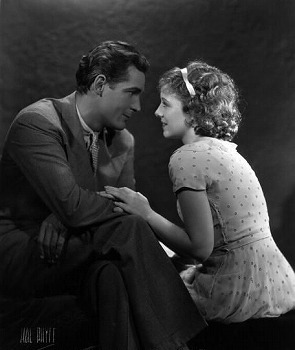
Tess of the Storm Country is a 1932 American pre-Code drama film directed by directed by Alfred Santell and starring Janet Gaynor, Charles Farrell, and Dudley Digges. It was released by Fox Film Corporation. It is based on the novel of the same name by Grace Miller White and its adaptation for the stage by Rupert Hughes.

Skinner's Dress Suit is a 1926 American silent comedy film produced and distributed by Universal Pictures and starring Reginald Denny. William Seiter was the director of the film which was based on the 1916 novel of the name by Henry Irving Dodge. Laura La Plante and Hedda Hopper co-star in this comedy which has seen video and DVD releases.

By Right of Purchase is a 1918 American silent drama film starring Norma Talmadge in a story produced by her husband Joseph Schenck. The film was distributed by Lewis J. Selznick's Select Pictures company. An up-and-coming actress and soon to be gossip columnist Hedda Hopper has a small role in this picture.
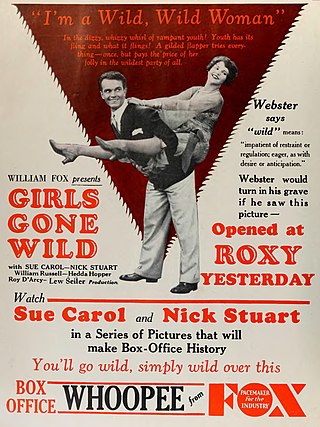
Girls Gone Wild was a 1929 pre-Code American melodrama film produced and released by Fox Film Corporation. The film was controversial as an early example of the rising tide of violence and disrespect for the law that would become key themes in the 1930s.
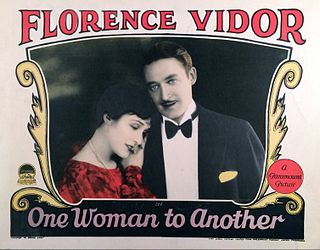
One Woman to Another is a lost 1927 American silent comedy film directed by Frank Tuttle and written by J.L. Campbell and George Marion Jr. based upon a play by Frances Nordstrom. The film stars Florence Vidor, Theodore von Eltz, Marie Shotwell, Hedda Hopper, Roy Stewart and Joyce Coad. The film was released on September 17, 1927, by Paramount Pictures.

What a Life is a 1939 American comedy film directed by Theodore Reed and starring Jackie Cooper, Betty Field, John Howard, Janice Logan, Vaughan Glaser, Lionel Stander, and Hedda Hopper. Written by Charles Brackett and Billy Wilder, the film was released on October 6, 1939, by Paramount Pictures.




















